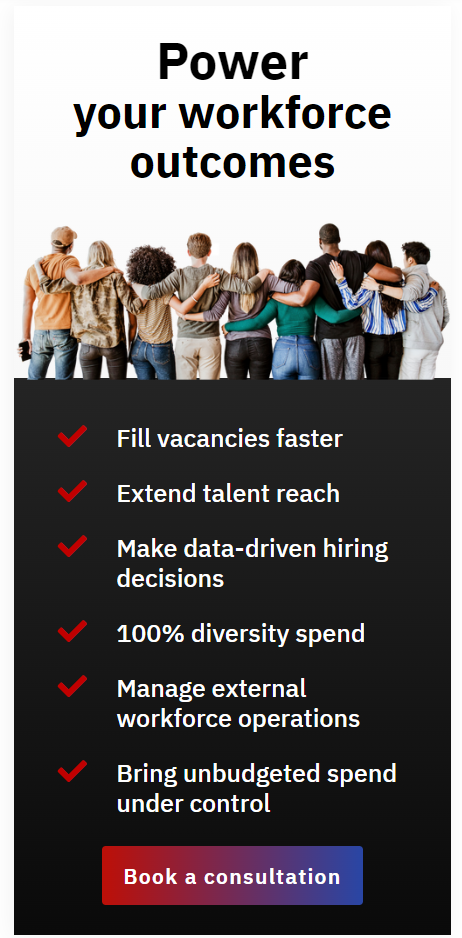The Onslaught of Digital Automation—Or Not?
Robots and artificial intelligence solutions are everywhere these days, and the discipline of workforce management is no different. Automation of the tedious tasks found within recruiting and workforce management is happening, and there’s lots of scope. It’s ripe for change. Yet, for many, it still hasn’t changed.
Workforce management tasks—such as filling open job vacancies, managing timesheets and making sure people get paid—are is grossly inefficient. Even after two decades of tech innovation the majority of organizations continue to rely on unsophisticated methods and tools to manage talent.
In an age of robots and AI, the talent industry remains largely a ‘people business.’
The Recruitment Industry is Broken
Everyone knows the recruitment industry is broken: Businesses pay exorbitant fees just to be introduced to suitable qualified talent, while applicants suffer the hassle and drudgery of applying for jobs, filling out forms time and again, and attending countless job interviews.
Like other industries that make their money as intermediaries between two or more parties—e.g. banking, public relations, house sales, etc. to name just a few— the suppliers that drive the talent sourcing industry benefit by acting as the honest broker. ‘Brokers’ have a vested interest in keeping things just as they are. They don’t want it to be easy for employers to find talent, or for workers to find jobs. Not, at least, without their help.
It can work differently. The digital technologies are there to make it happen.
You Don’t Need to Envision a Dystopian Future to Appreciate the Impact Digital Technologies Will Have on the Future of Work
Digital technologies like artificial intelligence mean that you can train robot brains to do what humans do. Recently, the management consulting firm McKinsey studied more than 2000 work activities across more than 800 occupations and concluded that approximately half of the work tasks that people do today, can be automated with known AI technologies. They concluded that about 30% of the activities in 60% of all occupations could be automated. Additionally, they note nearly all occupations will be affected by automation, but only about 5% of occupations could be fully automated by currently demonstrated technologies.
Fast-forward to 2022. How will recruitment work?
Will everyone that wants to work publish their profile on a global index of talent sitting on blockchain, removing the need for the middle-layer of staffing firms? Will CV sifting be performed using AI powered digital platforms? Are candidates to be interviewed online by robots? Will they be forced to self-serve themselves with ‘right to work’ background checks automated by machinery? And what about qualifying candidates with aptitude tests—will that also be automated?
We are on the cusp of a new era of machine recruitment, where an industry fuelled by brokering gets displaced by digital platforms and ecosystems. Looking towards the future of the recruitment industry, we can expect to be several steps closer to an industry that doesn’t need brokers anymore. What will the new enterprises be then that will ‘own’ the recruitment market?
Three of our Best Guesses for 2021
1. Remote Recruiting
Remote recruiting is already happening to some extent, but we are already seeing significant innovations happening in this space. The possibilities of remote interviews through video, pre-qualification through chatbots, online skills testing and IC compliance checks are transforming how organizations go about their hiring.
2. Virtual Employment Agencies
There are a lot of things employment agencies do that could be served equally well by chatbot oriented intermediary platforms and AI-led question and answer It’s highly likely that vendors will innovate Software-as-a-Service (SaaS) platforms to offer subscriptions to AI-led employment agency services in the very near future addressing many of the time-consuming activities such as job publishing, interview scheduling, CV-sifting, IC-compliance, and background checks, etc.
3. Open Labor Markets and Federated Labor Indexes
We can imagine that blockchain-style registries will emerge so that ANYONE around the world looking for a job can submit their interest to work. These may even be sponsored by governments. But these work exchanges will continue to need humans to contribute to the coaching of people looking for work to present their case in the best possible way. Supporting this type of federated marketplace, we can still see a role for intermediaries to act as mentors and coaches.
Open banking is a recent initiative—largely sponsored by the UK financial services industry—that could signpost the future of how labor markets might work. According to Wikipedia, open banking is linked to shifts in attitudes towards the issue of data ownership (as illustrated by regulations such as GDPR and concepts such as the open data movement). Banks turn into financial service platforms, technically implemented through a Banking as a Service-concept. As of January 2020, there are 202 FCA-regulated providers who are enrolled in Open Banking.

Ian Tomlin
Author


